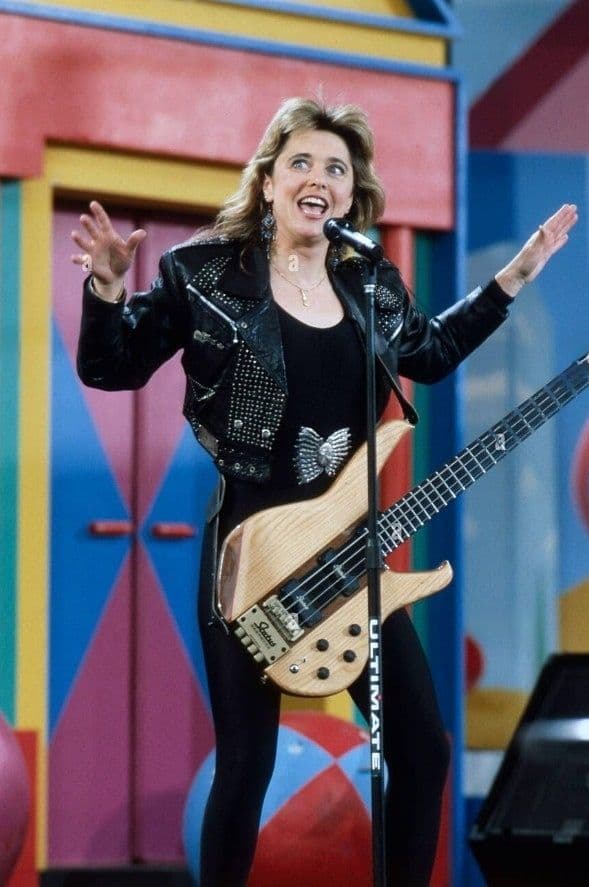
Rockin’ In The Free World: A Timeless Anthem for Freedom and Reflection
Ah, “Rockin’ In The Free World”. That electrifying anthem, a defiant roar against the backdrop of changing times. When you hear those opening chords, your mind might instantly conjure images of protest, of a world grappling with its own contradictions. It’s a song that has, for decades, resonated deeply with anyone who’s ever felt the sting of societal hypocrisy, the dissonance between grand promises and harsh realities.
Now, it’s interesting that you bring up Suzi Quatro in connection with this track. While Suzi Quatro, the groundbreaking Detroit rock ‘n’ roll queen, is synonymous with raw energy and empowering anthems like “Can the Can” and “Devil Gate Drive”, and has indeed covered “Rockin’ In The Free World” live and on albums such as 2005’s “Back to the Drive”, the song’s true genesis lies with the inimitable Neil Young.
It was Neil Young who penned and originally released “Rockin’ In The Free World” in 1989 on his album, “Freedom”. The song quickly became one of his most iconic and widely recognized works. While it didn’t smash into the very top echelons of the mainstream charts upon its initial release, its impact was far more profound than a simple chart position could convey. For example, it peaked at No. 2 on Billboard’s Mainstream Rock Tracks chart, and even made a showing on the UK Official Singles Chart, reaching number 83 in early 1994 when it was re-released. But its true legacy isn’t measured in weeks at number one; it’s etched in the collective consciousness as a potent symbol of dissent and observation.
The story behind Neil Young’s creation of this powerful piece is steeped in the political and social climate of the late 1980s. Legend has it that the inspiration struck when Young and his band, The Restless, were left without a planned tour of the Soviet Union. His guitarist, Frank “Poncho” Sampedro, quipped, “Well, I guess we’ll just have to keep on rockin’ in the free world.” That phrase, seemingly offhand, ignited something in Young’s mind. He saw in it a perfect, ironic encapsulation of the era.
The meaning of “Rockin’ In The Free World” is anything but straightforward. On the surface, the chorus, with its defiant chant, might sound like a celebratory anthem for freedom and democracy. But delve into the verses, and you uncover a biting, cynical critique of American society under the George H.W. Bush administration. Young masterfully juxtaposes the lofty rhetoric of “a thousand points of light” and “a kinder, gentler nation” with the grim realities of homelessness, drug addiction, and environmental degradation. The lyrics paint a picture of a nation seemingly thriving on the outside—with “department stores and toilet paper,” “fuel to burn, got roads to drive”—while simultaneously struggling with deep-seated social issues and a callous disregard for its most vulnerable.
It’s a protest song, undeniably so, yet one that’s often been misinterpreted as a purely patriotic declaration. Like Bruce Springsteen’s “Born in the U.S.A.”, its powerful, anthemic chorus has sometimes overshadowed the stark commentary embedded within its verses. This duality, this clever subversion of expectation, is part of what makes the song so enduring. It allowed it to be embraced by those who genuinely felt a sense of pride in their freedom, while simultaneously speaking volumes to those who saw the cracks beneath the polished veneer.
For us older listeners, “Rockin’ In The Free World” transports us back to a time of immense global change. Released just months before the fall of the Berlin Wall, it became an unofficial soundtrack to the collapse of old orders and the fragile emergence of new ones. It reminds us of a period when the promise of a “free world” felt both exhilarating and deeply uncertain, a time when the ideals we cherished were being tested and, at times, found wanting. Whether you first heard it echoing from a car radio, thumping through the speakers at a concert, or as a powerful statement on a news report, it likely left an indelible mark. It’s a song that, much like the human spirit it often seems to embody, keeps on rocking, continually prompting us to reflect on what “freedom” truly means.